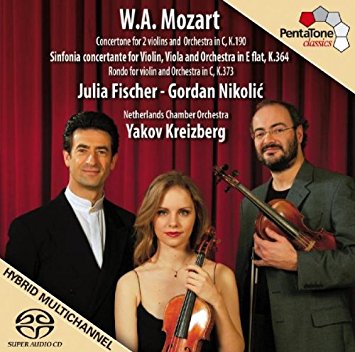Music |
Mozart: Sinfonia Concertante
By
Published: Mar 30, 2024
Category:
Classical
Easter is a day of glory: the triumph of Christ over death. It’s a day for Bach, who wrote the masterpieces we’ve heard for weeks and will, if we attend certain services, hear again today. That music weighs heavily on some of us, reminding us of other holidays and dear ones who are lost to us. So… enough of Bach, bring on Mozart!
This Mozart was inspired by grief — but the violinist’s joy reaches across time and loss. Her pleasure in the music is total. In a season when events and personalities can easily submerge us in gloom, her pleasure is pure. Just watch the video — share Julia Fischer’s joy. For this listener, it’s a blessing. My holiday wish: that it’s also yours.
In 1778, when he was poor and unloved in Paris, the 22-year-old Mozart watched his mother die. He grieved mightily, and left Paris as soon as he could. The following year he wrote the Sinfonie Concertante.
Wikipedia doesn’t mention the work in its biography of Mozart. But then neither did Mozart. Nor did any of his contemporaries. It’s believed he wrote the Sinfonia Concertante so he could play it with the Salzburg court Konzertmeister Antonio Brunetti. Some say they can hear signs of grief in the second movement. Some say that “darker undercurrents” in the C minor andante reflect his “his smoldering discontent with his Salzburg servitude.”
No matter. Just listen to the 24-year-old violinist Julia Fischer and her partner, Gordan Nikolic, as they record some of this piece. Her smile speaks volumes. [To buy the CD from Amazon, click here.]
Notice where Fischer and Nikolic stand — in the middle of the orchestra. That produces a sound more like what you’d hear in a live performance. They don’t grab the limelight, they blend. And the viola — Mozart’s favorite string instrument — is equal to the violin.
Fun Fact: “The Sinfonia Concertante was mentioned in William Styron’s 1979 novel Sophie’s Choice; after a stranger molests Sophie on the subway, she hears the Sinfonia Concertante on the radio, which brings back memories of her childhood in Kraków and snaps her out of her depression.”


